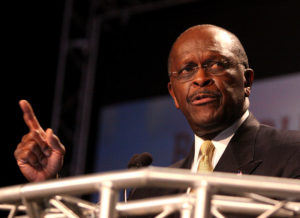Herman Cain: You Make The Call (Take Our Poll)
Republican candidate Herman Cain dropped out of the presidential race on Saturday after facing charges of infidelity and sexual harassment.
I’d like to ask you to help me with a thought experiment.
Imagine you were Herman Cain’s campaign manager. Right before he entered the race, you asked him to disclose any potential vulnerabilities to you. He admitted to you that he had an affair and that the National Restaurant Association had settled a couple of sexual harassment suits on his behalf. Neither the public nor the press had learned anything about those charges yet.
He asked you to devise the most effective public relations strategy you could think of to help him handle those charges. You can’t simply tell him to drop out of the race – he’s insistent upon staying in.
What would you have advised him to do?
Option One: Full Disclosure: You advise him to get in front of the story by disclosing everything he knows to the public. That would allow him to deal with the story up front (and only one time) instead of having a series of painful “rolling disclosures.”
He might even throw in a dose of religion, saying that he hasn’t been a perfect man but that he’s asked forgiveness from God and his wife. That approach seems to have worked for Newt Gingrich, who cheated on and divorced two ill wives before marrying his third wife.
Option Two: Partial Admission: You advise Mr. Cain to admit that he has been imperfect in his marriage, but instruct him to refuse going into the details. If a reporter asks about a specific charge of sexual harassment, for example, you tell him to say, “I have not been perfect as a husband, but that’s a matter that will remain private between me and my wife. I am not going to discuss these allegations any further.”
This approach worked when Bill Clinton was running for president in 1992. He admitted to 60 Minutes’ Steve Kroft that he had “caused pain” in his marriage, but refused to say exactly how.
Option Three: Unwavering Denial: After speaking with Mr. Cain, you quickly realize that even if the allegations are true, none of the women are likely to have any specific evidence. You believe any allegations would be a “he said, she said,” and you instruct Mr. Cain to stay silent until and unless any women come forward – at which point he should strongly refute any allegations anybody makes.
This is different that Mr. Cain’s strategy, in that his denials weren’t consistent and changed over time. Instead, you would advise Mr. Cain to forcefully deny every allegation and demand credible proof. In Mr. Cain’s case, the proof was circumstantial – even the woman who claimed a 13-year affair couldn’t provide a single photograph, plane ticket, or hotel invoice.
So, which option would you choose? Please vote below:
[poll id=”8″]
Please add any additional thoughts or approaches to the comments section below.
Have the best of the blog delivered to your inbox twice per month! Enter your name in the box on the upper right of the blog to join our mailing list.




Full disclosure at the start. You appear to be honest and truthful. As you are not yet a big hitter in the campaign the news may be lost and or underreported but is still in the public domain. If it gets dragged up later you can peg it as old news and it stops you wasting everyones time by campaigning for months and spending millions of dollars only to have it all go down the toilet because you cannot keep it in your trousers and be honest about it.
His staff should have tried to ascertain as many facts and possible claims there could be hiding out there. They should have developed a response that was forthcoming and stuck to it. They should have drilled the candidate to stick to the story, and they should have had some internal discipline to stick to the response and not attempt to muddy the water by inaccurately disclosing links to the story that were baseless at best. And don’t get me started on the cell phone call to Geraldo Rivera while he was live on the air.